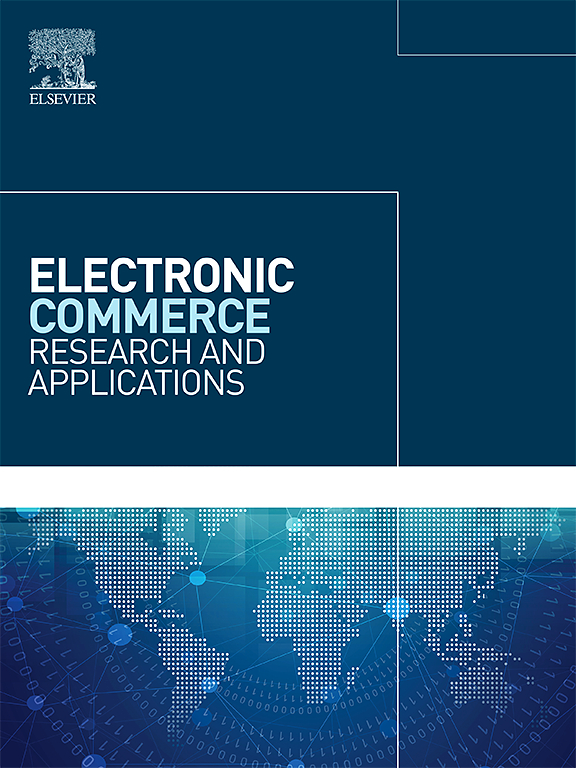The merits of the pre-owned strategy: Price competition in multichannel digital goods distribution
IF 5.9
3区 管理学
Q1 BUSINESS
Electronic Commerce Research and Applications
Pub Date : 2025-02-01
DOI:10.1016/j.elerap.2025.101486
引用次数: 0
Abstract
The provision of pre-owned physical version products by traditional brick-in-store platforms (such as GameStop) was once highly profitable but has rapidly declined with the rise of digital content. As publisher firms sell digital versions directly, they now compete with platforms that sell both new and pre-owned physical versions. This paper conducts an economic analysis on a traditional brick-in-store platform’s pre-owned strategies and a publishing firm’s competition strategies. We examine two key factors that significantly influence competition between pre-owned, digital, and physical versions: distribution contracts (wholesale and agency) and countermeasures (such as exclusive digital content). Generally, pre-owned strategies hurt both the firm and the platform. However, our analysis reveals that pre-owned products benefit platforms under certain condition. From the platform’s perspective, when beneficial, wholesale contract is preferable to agency contracts. Our findings propose an “enticement yet limitation” principle for platform managers when developing pre-owned strategies. From the firm’s perspective, offering extra content as countermeasure is beneficial, helping to mitigate the harmful effects of pre-owned versions and enhancing competitive effectiveness. Our results reveal the operational mechanism behind such content monetization strategy and emphasize the strategic importance of countermeasures when responding to platforms’ pre-owned strategies. Finally, we check the robustness in extensions with considering differences in costs, reservation values and various pre-owned versions. While the pre-owned product has sparked controversy and is generally believed to be detrimental to the industry, our results suggest that content monetization strategy in countermeasure may sometimes be economically beneficial to both firms and platforms. Our findings shed light on the key factors publisher firms and platforms should consider when deairing with pre-owned strategies in the digital content industries.
二手战略的优点:多渠道数字商品分销中的价格竞争
传统实体店平台(如GameStop)提供的二手实体版产品曾经利润丰厚,但随着数字内容的兴起,这种模式迅速衰落。由于出版商直接销售数字版本,他们现在与销售新版本和二手实体版本的平台竞争。本文对传统实体店平台的二手策略和出版公司的竞争策略进行了经济分析。我们研究了影响二手、数字和实体版本之间竞争的两个关键因素:分销合同(批发和代理)和对策(如独家数字内容)。一般来说,二手策略对公司和平台都不利。然而,我们的分析表明,在一定条件下,二手产品对平台有利。从平台的角度来看,在有利的情况下,批发合同比代理合同更可取。我们的研究结果为平台管理者在制定二手策略时提出了一个“诱惑但有限制”的原则。从公司的角度来看,提供额外的内容作为对策是有益的,有助于减轻二手版本的有害影响,提高竞争效率。我们的研究结果揭示了这种内容货币化策略背后的运作机制,并强调了在应对平台的二手策略时对策的战略重要性。最后,在考虑成本、保留值和各种预拥有版本差异的情况下,我们检查了扩展的鲁棒性。虽然二手产品引发了争议,并且通常被认为对行业有害,但我们的研究结果表明,对策中的内容货币化策略有时可能对公司和平台都有经济上的好处。我们的研究结果揭示了出版商和平台在选择数字内容行业的二手策略时应该考虑的关键因素。
本文章由计算机程序翻译,如有差异,请以英文原文为准。
求助全文
约1分钟内获得全文
求助全文
来源期刊

Electronic Commerce Research and Applications
工程技术-计算机:跨学科应用
CiteScore
10.10
自引率
8.30%
发文量
97
审稿时长
63 days
期刊介绍:
Electronic Commerce Research and Applications aims to create and disseminate enduring knowledge for the fast-changing e-commerce environment. A major dilemma in e-commerce research is how to achieve a balance between the currency and the life span of knowledge.
Electronic Commerce Research and Applications will contribute to the establishment of a research community to create the knowledge, technology, theory, and applications for the development of electronic commerce. This is targeted at the intersection of technological potential and business aims.
 求助内容:
求助内容: 应助结果提醒方式:
应助结果提醒方式:


